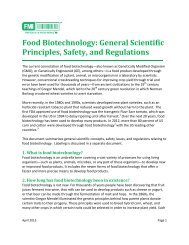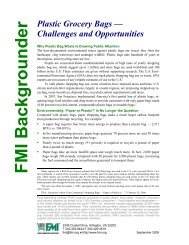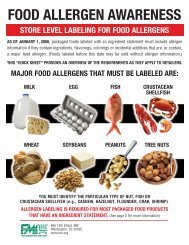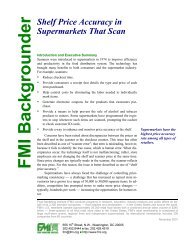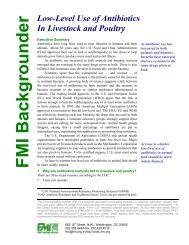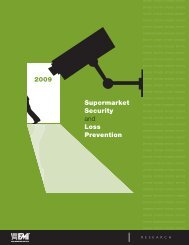Untitled - Food Marketing Institute
Untitled - Food Marketing Institute
Untitled - Food Marketing Institute
You also want an ePaper? Increase the reach of your titles
YUMPU automatically turns print PDFs into web optimized ePapers that Google loves.
Access to Healthier <strong>Food</strong>s: Opportunities and<br />
Challenges for <strong>Food</strong> Retailers in Underserved Areas<br />
Introduction<br />
Since the first supermarket opened its doors in 1930, the business of food retailing<br />
has remained consistent: sell a wide variety of foods at a reasonable cost. Over the<br />
years, food retailers have adjusted and adapted their formats, services and<br />
products to accommodate the needs of their customers. Like all businesses, food<br />
retailing is a for-profit enterprise, but unlike other businesses having larger profit<br />
margins, the typical grocery store’s profit after taxes is approximately 1.3% with<br />
the average store taking in approximately $6,000 per week in profit (based on<br />
median annual sales of $466,000). Although supermarkets provide an essential<br />
service to the communities they serve, they are businesses which must produce<br />
profit to stay viable. The lack of a supermarket in a community can have many<br />
consequences affecting the economy, health and social structure of the surrounding<br />
areas. However, encouraging supermarket development where it is needed is a<br />
multi-dimensional process requiring community support, financial investment and<br />
creative partnerships.<br />
2345 Crystal Drive ● Suite 800 ● Arlington, Virginia ● 22202<br />
http://www.fmi.org<br />
<strong>Food</strong> <strong>Marketing</strong> <strong>Institute</strong> (FMI) conducts programs in public affairs, food safety, research, education and industry<br />
relations on behalf of its 1,500 member companies — food retailers and wholesalers — in the United States and<br />
around the world. FMI’s U.S. members operate approximately 26,000 retail food stores and 14,000 pharmacies.<br />
Their combined annual sales volume of $680 billion represents three-quarters of all retail food store sales in the<br />
United States. FMI’s retail membership is composed of large multi-store chains, regional firms and independent<br />
supermarkets. Its international membership includes 200 companies from more than 50 countries. FMI’s associate<br />
members include the supplier partners of its retail and wholesale members.<br />
Access to Healthier <strong>Food</strong>s: Opportunities and Challenges for <strong>Food</strong> Retailers in Underserved Areas<br />
1<br />
July, 2011




